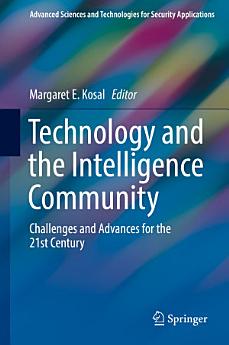Technology and the Intelligence Community: Challenges and Advances for the 21st Century
Über dieses E-Book
Technology and innovation have played an important role in determining the course of development of the intelligence community. Intelligence gathering for national security, however, is not limited only to the thread of technical capabilities but is a complex fabric of organizational structures, systemic undercurrents, and the role of personnel in key positions of decision making.
The book’s findings and conclusions encompass not just temporal variation but also cut across a diverse set of issue areas. This compilation is uniquely placed in the interdisciplinary space combining the lessons from key cases in the past to current developments and implementation of technology options.
Autoren-Profil
Dr. Margaret E. Kosal is Associate Professor in the Sam Nunn School of International Affairs at Georgia Institute of Technology and Director of the Sam Nunn Security Program. During AY 2016-2017, she has been appointed Senior Adjunct Scholar to the Modern War Institute at West Point. Her research explores the relationships among technology, strategy, and governance. She focuses on two, often intersecting, areas: reducing the threat of weapons of mass destruction (WMD) and understanding the geopolitics of emerging technologies. She is the author of Nanotechnology for Chemical and Biological Defense, which explores scenarios, benefits, and potential proliferation threats of nanotechnology and other emerging sciences. Formally trained as an experimental scientist, Kosal earned a doctoral degree in Chemistry from the University of Illinois at Urbana-Champaign (UIUC) working on biomimetic and nano-structured functional materials. She is also the co-founder of a sensor company, where she led research on medical, biological, chemical, and explosive detection. Kosal previously has served as a Senior Advisor to the Chief of Staff of the U.S. Army, as Science and Technology Advisor within the Office of the Secretary of Defense (OSD), and as an Associate to the National Intelligence Council (NIC), in addition to other consulting. She has been recognized for her leadership across the U.S. federal government, specifically for efforts to coordinate across the DoD as part of the interagency Nonproliferation and Arms Control Technology Working Group, reporting to the National Security Council, and as member of the interagency federal group charged with leading the National Nanotechnology Initiative (NNI). Kosal was nominated to and led the US involvement in the NATO Nanotechnology for Defense Working Group. She is the recipient of multiple awards including the Office of the Secretary of Defense Award for Excellence. Recently, she was appointed the next Editor-in-Chief ofthe Cambridge University Press journal, Politics and the Life Sciences. She has lectured widely internationally, including invited briefs to the Organisation for the Prohibition Chemical Weapons (OPCW) in The Hague, the United Nations Interregional Crime and Justice Research Institute (UNICRI), and the United Nations Office for Disarmament Affairs (UNODA).





